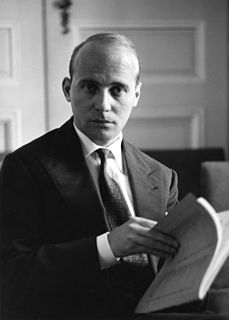Related Research Articles

Hans Werner Henze was a German composer. His large oeuvre of works is extremely varied in style, having been influenced by serialism, atonality, Stravinsky, Italian music, Arabic music and jazz, as well as traditional schools of German composition. In particular, his stage works reflect "his consistent cultivation of music for the theatre throughout his life".

Hans Magnus Enzensberger is a German author, poet, translator and editor. He has also written under the pseudonym Andreas Thalmayr.
Peter Ruzicka is a German composer and conductor of classical music.

Paul Dessau was a German composer and conductor. He collaborated with Bertolt Brecht and composed incidental music for his plays, and several operas based on them.

Darmstadt School refers to a group of composers who were associated with the Darmstadt International Summer Courses for New Music from the early 1950s to the early 1960s in Darmstadt, Germany, and who shared some aesthetic attitudes. Initially, this meant just four composers, Pierre Boulez, Bruno Maderna, Luigi Nono, and Karlheinz Stockhausen, but others came to be added, in various ways. The term does not refer to an educational institution.

Hans Werner Henze composed the nine Sacred Concertos that comprise his Requiem over the course of three years from 1991 to 1993 on commissions from the London Sinfonietta, Suntory Corporation for the NHK Philharmonic, and Westdeutscher Rundfunk, Cologne. The first movement, Introitus: Requiem Aeternam was commissioned by the London Sinfonietta as part of a memorial concert for Artistic Director Michael Vyner who died on 20 October 1989. In addition to Henze, the London Sinfonietta also commissioned seven other prominent composers to write works in Vyner's memory to make up the program which was performed on the 6 May 1990.

The Life of Edward II of England, also known as Edward II, is an adaptation by the German modernist playwright Bertolt Brecht of the 16th-century historical tragedy by Marlowe, The Troublesome Reign and Lamentable Death of Edward the Second, King of England, with the Tragical Fall of Proud Mortimer (c.1592). The play is set in England between 1307 and 1326. A prefatory note to the play reads:
El Cimarrón is a composition by the German composer Hans Werner Henze, written when the composer lived in Cuba in 1969–1970. It is subtitled Biographie des geflohenen Sklaven Esteban Montejo, and the libretto by Hans Magnus Enzensberger is based on the oral autobiography related in 1963 to Miguel Barnet by Montejo, who was also a veteran of the Cuban War of Independence (1895–98). See also: Cimarron (people).
Symphony No. 6 for two chamber orchestras by Hans Werner Henze was written in 1969.
Compases para preguntas ensimismadas is a musical composition for viola, strings, wind sextet and percussion by the German composer Hans Werner Henze.
The Eighth Symphony by the German composer Hans Werner Henze was composed in 1992–93.

Hans-Jürgen von Bose is a German composer.

Gisela! oder: Die merk- und denkwürdigen Wege des Glücks is an opera by Hans Werner Henze.

The Theater des Westens is one of the most famous theatres for musicals and operettas in Berlin, Germany, located at Kantstraße 10–12 in Charlottenburg. It was founded in 1895 for plays. The present house was opened in 1896 and dedicated to opera and operetta. Enrico Caruso made his debut in Berlin here, and the Ballets Russes appeared with Anna Pavlova. In the 1930s it was run as the Volkstheater Berlin. After World War II it served as the temporary opera house of Berlin, the Städtische Oper. In 1961 it became the first theatre in Germany to show musicals. Since then it has become the "German equivalent of Broadway extravaganzas", putting on plays and musical comedies.
Heliogabalus imperator, allegoria per musica is an orchestral work by the German composer Hans Werner Henze.

Ein Landarzt is a one-act chamber opera composed by Hans Werner Henze. The libretto was written by Henze and is closely based on Kafka's 1917 short story "Ein Landarzt". The work was originally composed as a radio opera and was premiered on 19 November 1951 in a broadcast by Nordwestdeutscher Rundfunk. Henze subsequently revised the work in 1964 both as a monodrama for baritone and chamber orchestra and as a one-act staged opera. The stage version was premiered by the Oper Frankfurt on 30 November 1965.
The Vokalsinfonie by Hans Werner Henze was written in 1955. The sung text is by German writer Heinz von Cramer.

Roswitha Trexler is a German operatic soprano and mezzo-soprano who became internationally known especially as an interpreter of the music of Hans Eisler and for her commitment to avantgarde vocal music.
Peter Petersen is a German musicologist.